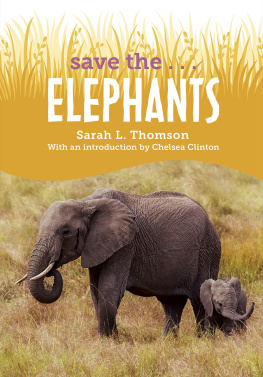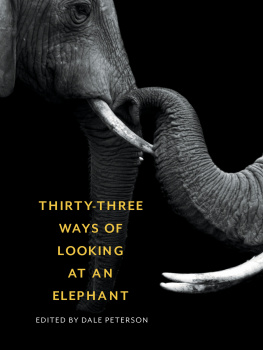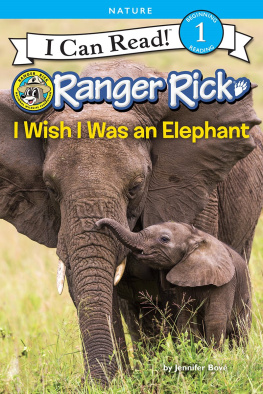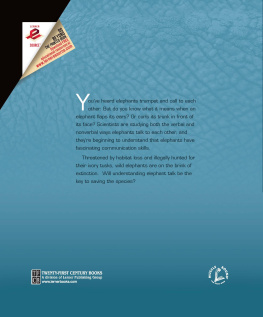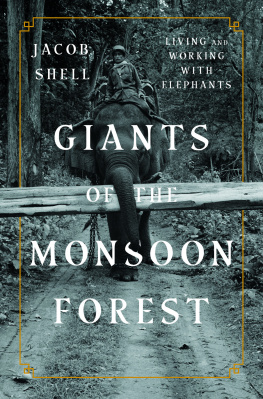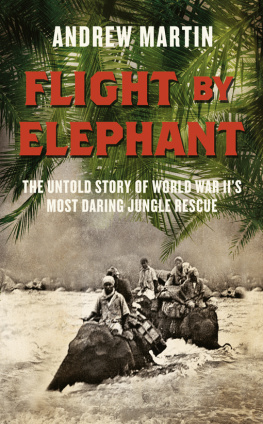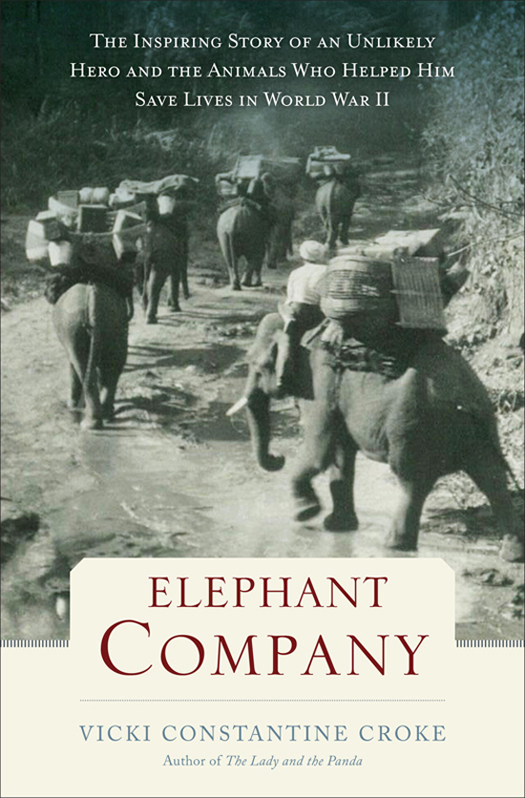
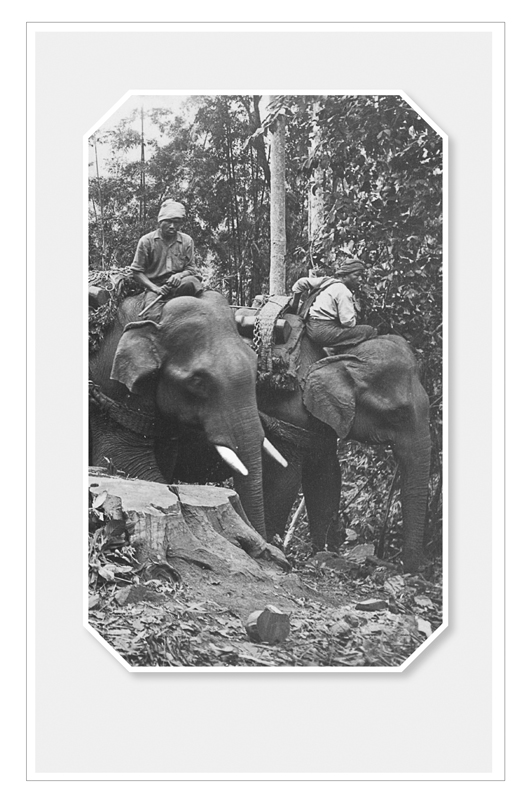
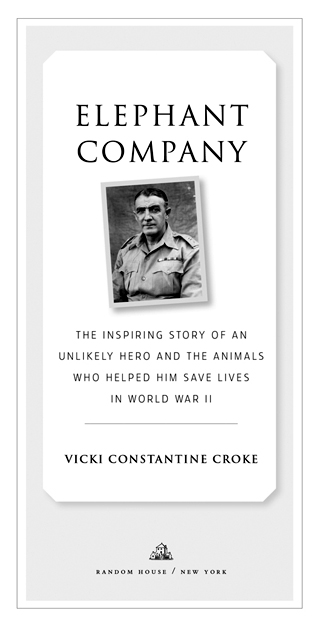
Copyright 2014 by Vicki Constantine Croke
Map copyright 2014 by Simon M. Sullivan
All rights reserved.
Published in the United States by Random House, an imprint and division of Random House LLC, a Penguin Random House Company, New York.
R ANDOM HOUSE and the H OUSE colophon are registered trademarks of Random House LLC.
Images on courtesy of Di Clarke. All others courtesy of Treve Williams.
L IBRARY OF C ONGRESS C ATALOGING-IN -P UBLICATION D ATA
Croke, Vicki.
Elephant Company: the inspiring story of an unlikely hero and the animals who helped him save lives in World War II / Vicki Croke.
pages cm
ISBN 978-1-4000-6933-0
eBook ISBN 978-0-679-60399-3
1. Williams, J. H. (James Howard) 2. World War, 19391945CampaignsBurma. 3. Elephant Company (Great Britain) 4. Bandoola (Elephant) 5. Animals in loggingBurmaHistory20th century. 6. Asiatic elephantBurmaHistory20th century. 7. Working elephantsBurmaHistory20th century. 8. AnimalsWar useHistory20th century. 9. BurmaHistoryJapanese occupation, 19421945. I. Title. II. Title: Inspiring story of an unlikely hero and the animals who helped him save lives in World War II.
D767.6.C76 2014 940.54259591092dc23 2013032280
www.atrandom.com
Jacket design: Victoria Allen
Jacket photographs: courtesy of Treve Williams
v3.1
CONTENTS

PART ONE
THE MAKING OF AN ELEPHANT WALLAH
PART TWO
LOVE AND ELEPHANTS
PART THREE
WAR ELEPHANTS
INTRODUCTION

J AMES H OWARD W ILLIAMS WAS A W ORLD W AR II LEGEND . N EWSPAPERS and magazines around the world, including The Times of London, the Melbourne Herald, The New York Times, The New Yorker, and Life magazine, loved telling the story of the quietly charismatic war hero with a dash of mysticism, who could talk to elephants. He had gone to work in the teak industry in Burma in 1920, and over the years displayed a remarkable gift for understanding the hearts and minds of the great beasts who pushed, pulled, and dragged the logs to the riverways. Without any veterinary training, Williams had evolved into a skilled and intuitive animal doctor. He knew more about elephants, one paper said, than any other white man.
When World War II broke out, Williams formed a unique and indispensible unit for the Allies. His Elephant Company not only helped defeat the Japanese in Burma, it also saved the lives of countless refugees. For much of the war, he operated far out in front of the Allied forces, facing the enemy in wild mountainous terrain.
The work of elephants, it turned out, was vital to troop movement. They made bridge building possible, and they hauled supplies to units bogged down in places even mules couldnt negotiate. Their services were so crucial that they were coveted by both the Allied forces and the Japanese.
Williamss fearless snatching of elephants from Japanese hands made headlines and earned him a popular nickname, Elephant Bill. As part of the elite Force 136, fighting behind enemy lines, he waged what the Daily Mirror called a holy war against the Japanese. His extraordinary exploits became nearly mythic when he saved a group of evacuees, and like the famous military hero from 218 B.C ., conducted his own Hannibal trek, crossing not the Alps, but several mountain ranges between Burma and India with his train of elephants.
The Daily Mails headline Elephant Bill Won His War: Beat Burma Japs might have been reductive, but Williams was awarded the Order of the British Empire and mentioned in dispatches twice for gallantry in facing the enemy. His efforts led famed field marshal Sir William Slim to write movingly about how much he owed Williams and the elephants.
All the correspondents of the time touted what Williams did to help elephants. But Williams thought theyd gotten it backward. It was the elephants who had helped him. Not only did they give him joy and a reason to live in the lonely jungles, but they became his teachers. Look, he told one reporter, Ive learned more about life from elephants than I ever did from human beings. And there, hidden in the inverse of all those newspaper articles, was the even more astonishing, if overlooked, story: how the elephants had transformed a carefree young man into a war hero.
Living day by day with elephants, he had absorbed their deeper, more philosophical cues. In fact, he discovered in them the virtues he would work to develop in himself: courage, loyalty, the ability to trust (and the good sense to know when to be distrustful), fairness, patience, diligence, kindness, and humor. Not a bad way to learn, he said, because the elephant takes a more kindly view of life than we do.
Some of the most pivotal moments of Williamss life were guided by the elephants creed. He won the faith of a monstrous boss by refusing to back down, just as he had seen serious bull elephants do when tested by bigger, older ones. Two elephants who scrapped one day, he learned, would forage together the next, because they had won each others respect. Williams would also forgive an employee who tried to kill him when he realized that the attack never would have happened if he had treated the man with the dignity he accorded his elephants. He would not make that mistake again. Even his courtship of Susan, the woman who would become his wife, mimicked the graceful tuskers who gently followed a female, reading her mood and approaching when invited. Finally, when Williams came to command men in war, he fully understood the difference between a leader and a bully. The elephants had taught him this distinction, too, when they organized themselves at treacherous river crossings. Time and again, he found that the universal truths he had observed in the jungle applied not just to elephants but to people, too.
Williams had witnessed a life among the elephants that would be hard for those outside to fathomin fact, he reported behaviors that many would not believe until they were validated decades later by biologists in the field. He had seen these creatures thoughtfully solve problems, use tools, protect one another, express joy and humor, stand up for something more important than their own safety, and even, perhaps, comprehend the concept of death. There was a largeness to them that was about more than their physical size, a quality triggered especially when their sense of decency or outrage was provoked.
Could one really call it decency? Williams thought so. Courage defined them. He had witnessed their braverymothers defending babies, tuskers squaring off against each other, closely bonded females running toward danger, not away, to protect one another.


